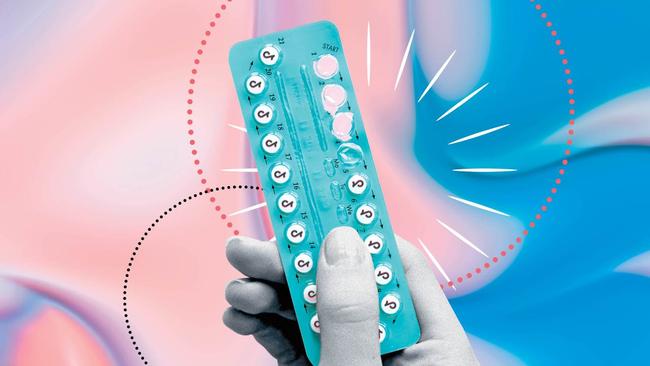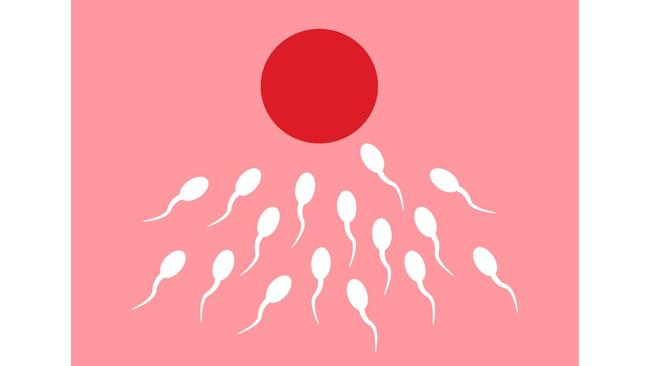The concerning truth of TikTok's 'natural' contraception trend
Here’s a 2023 craze we didn’t see coming

Lifestyle
Don't miss out on the headlines from Lifestyle. Followed categories will be added to My News.
Social media influencers are removing their own IUDs and binning the pill in favour of ‘natural’ family planning — and telling millions of followers to do the same. Many of these content creators have zero medical qualifications, which has doctors worried. So, should you go au naturel? We asked the experts.
The ‘Corn Kid’ justifiably won us over on TikTok in 2022, but natural contraception as a trend? That was unexpected.
At the behest of well-meaning social media influencers, women are ditching their hormonal birth control, such as the oral contraceptive pill, in favour of ‘fertility awareness’ methods. Some influencers are even crushing the pill into their shampoo in a quest for longer, thicker hair. But that’s a whole other story.
Like what you see? Sign up to our bodyandsoul.com.au newsletter for more stories like this.
Fertility awareness methods help you to know, or guess when you’re ovulating in order to prevent pregnancy. Or, to get pregnant, if that’s your goal.
They include tracking your menstrual cycle on a calendar or app, taking your temperature daily with a basal body thermometer, monitoring changes in your cervical mucus, using ovulation testing kits or engaging a ‘fertility coach’. Another term for this is natural family planning (NFP), the hashtag of which has garnered 98 million views on TikTok.
‘IUD self-removal’ has had more than 600 million views, but for the record, an IUD, or intrauterine device, should only be removed by a health professional. And the trend isn’t limited to just one platform.
A study in the Health Communication journal found that young people are turning to YouTube vloggers, rather than their GPs, for birth control information. Understandably, this has doctors increasingly concerned.
Dr Tessa King, a GP and spokesperson for Jean Hailes women’s health centres, has seen patients who, after watching influencers, reject hormonal contraception and ask about NFP.
They’re worried because birth control methods such as the pill, IUDs, vaginal rings and hormonal implants and injections aren’t considered ‘natural’.“They’re concerned about side effects mentioned by influencers, and whether it’s going to affect their future fertility or their mood,” says King.
“Often a social media influencer has personally had a bad experience with a single method of hormonal contraception. I am spending time debunking ideas that might be [relevant] for an influencer, but not for the patient sitting in front of me.”
Hormonal contraception does come with some risks, of course. For example, the combined oral contraceptive pill increases the risk of blood clots (as does pregnancy), and can slightly increase the risk of breast and cervical cancer. On the other hand, the risk of endometrial and ovarian cancer is much lower in women who use or have used the pill in the past.

Hormonal contraceptives can also help alleviate health issues such as endometriosis, debilitating period pain, heavy periods, premenstrual mood disturbance or polycystic ovarian syndrome, adds King. “I don’t think hormonal contraception is simply good or bad,” says Dr Clare Boerma, a GP and the medical director at Family Planning Australia.
“Every medicine offers potential benefits, but there’s always the possibility of side effects, which affect people differently. Not every contraceptive will suit every person. The brilliant thing is, we have many choices.”
One possible side effect of NFP? An unexpected pregnancy, especially if the user doesn’t monitor ovulation signs and symptoms by the book. “The typical efficacy of fertility awareness methods is reported to be 76 to 93 per cent,” says Boerma. The efficacy of the set-and-forget IUD is more than 99 per cent.
“The methods require a lot of effort. It can be challenging to predict the timing of ovulation. If you’re sick or stressed, the signs and symptoms can change. People can have irregular periods.”
Ultimately, if you don’t mind getting pregnant then NFP might be for you. But before you stop or change contraception, tap your GP, not TikTok.
Originally published as The concerning truth of TikTok's 'natural' contraception trend


